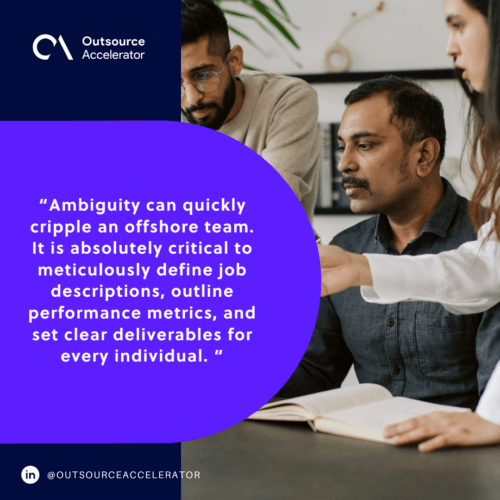5 Best practices for thriving with offshore teams

Let’s cut to the chase: if your business isn’t exploring global talent, you’re likely leaving money and untapped potential on the table. The days of solely relying on local hires are becoming a relic in a world demanding agility and specialized skills.
Offshore teams aren’t just “outsourcing” anymore; they’re a strategic chess move to access vast talent pools, slash expenses, and run a 24/7 operation.
Yet, turning this strategic potential into seamless reality requires more than just good intentions.
In the 545th episode of the Outsource Accelerator Podcast, Rodney Frost from Integrated OS lays out his tips for handling remote teams.
Join us as we unpack the essential best practices and confront the common challenges head-on, equipping you to build an offshore team that genuinely drives your success.
5 best practices for successful offshore teams
Here are five practices you should keep in mind when managing your offshore teams:
1. Establish crystal-clear communication and collaboration
The bedrock of any successful remote operation is impeccable communication. It’s not enough to simply have communication tools; teams must understand how and when to use them effectively.
This means implementing robust platforms for video conferencing, project management, and instant messaging. Setting clear communication protocols for response times and preferred channels is crucial.
As Rodney states, “You’ve gotta clearly articulate your model and clearly articulate the value you’re adding to the team.”
2. Define roles, expectations, and accountability with precision
Ambiguity can quickly cripple an offshore team. It is absolutely critical to meticulously define job descriptions, outline performance metrics, and set clear deliverables for every individual.
Utilizing frameworks like RACI matrices (Responsible, Accountable, Consulted, Informed) can be invaluable in clearly mapping out ownership and accountability.
Rodney notes that Australian businesses sometimes lack documented processes because “we’ve had lots of long-serving people that have done it and they just know it.”
But with offshore teams, “you can build them as you’re doing the teaching”.
This ensures precise definitions that minimize misunderstandings and enhance overall efficiency.
3. Foster a culture of trust and integration
An offshore team is not merely a transactional resource; it’s an integral extension of your core business. Building true trust is paramount, cultivated through transparency, consistent feedback, and mutual respect.
Rodney emphasizes this, stating, “This is a business of trust.”
Promoting cultural integration and understanding through cross-cultural training and interaction helps bridge geographical divides. Organizing virtual and, where possible, in-person team-building activities can profoundly foster camaraderie and loyalty, significantly boosting retention.
Rodney highlights their 95% retention rate as proof that their “family culture with family values” works because “you really do want to make sure that they’re engaged.”
4. Invest in ongoing training and professional development
The success of your offshore teams is directly tied to their capabilities. This means providing comprehensive onboarding that immerses them in your company culture, tools, and specific processes.
Beyond initial training, offering continuous professional development and upskilling opportunities ensures they remain at the top of their game.
Rodney explains that his company runs “soft skills training out of hours,” covering common areas like advanced Excel.
Ensuring the offshore team has access to the same learning resources as onshore staff boosts their motivation, enhances retention, and elevates overall performance.
5. Ensure legal & HR compliance from day one
The “easy start” models in outsourcing can create significant legal pitfalls.
Rodney warns against directly employing individuals offshore as contractors. He cites the “Joanna Pascua case” where an Australian company faced substantial penalties for violating Australian workplace protections for a Philippine-based paralegal.
Businesses must understand that “workforce regulations in every country need to be abided by”.
Partnering with a proper BPO or Employer of Record (EOR) is essential to manage legal risks, tax compliance, and ensure employees receive local benefits. This protects both the business and the offshore team member.

Common challenges when building and managing offshore teams
Despite the clear benefits and best practices, building and managing an offshore team comes with its own set of hurdles that demand proactive solutions:
Communication and cultural barriers
Differences in language nuances, communication styles, and cultural norms can lead to misunderstandings.
Rodney himself admitted that expanding into South Africa was “harder than we thought” due to underestimating the “cultural aspect of it.” Managing expectations across different work norms and holidays is key.
Data security and compliance concerns
The transfer and storage of sensitive data across international borders present inherent risks.
Clients often have “InfoSec information security concerns” and worries about compliance. Navigating varying data protection laws (such as GDPR and HIPAA) and ensuring adherence requires robust protocols.
Performance monitoring and management
Direct oversight of remote staff can be challenging. Studies have found that 80% of companies monitor their remote and hybrid workers as a way to circumvent the issue.
Ensuring consistent productivity and quality across distances requires effective tools and clear metrics.
Rodney shared an “interesting stat” that work-from-home teams in the Philippines took “one third” the illness leave of office workers. He supposed they might be working while sick or taking less leave, potentially impacting productivity.
He suggests considering office-based or hybrid models for better oversight.
Building resilient global teams
Offshore teams thrive on clear communication, strong culture, strategic talent investment, and operational excellence. Embracing these practices and tackling challenges unlocks sustainable potential, making businesses leaders in leveraging global talent for growth.








 Independent
Independent




